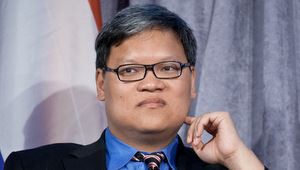To get rich is glorious was China's leading principle for decades, but slowly the country starts to search for a moral foundation, says
The issue of spiritual emptiness is not exclusive to the Chinese, Johnson said, opining that many in the U.S. probably share this disillusionment with modern capitalistic society. He pointed to populist movements in the west, which are building momentum against a system that many see as rigged, where too much weight is placed on economics.
“Society since the reform era has become defined by economics: to get rich is glorious. And that there aren’t too many other values in society,” Johnson said.
Like in the U.S., there is an increasing suspicion of unfairness in China. Johnson described a scenario that one might witness in Beijing: a Chinese citizen who worked for the government 15 years ago and was awarded 10 apartments in Beijing that are now worth about $1.5 million each. Johnson said this scenario is “perfectly possible.” That person can afford to drive around in sports cars and send their children to expensive schools, flaunting their wealth.
“People are not stupid. They realize this is how a lot of money was made in China, and they feel cheated,” he said.
Johnson admitted that there are plenty of brilliant entrepreneurs in China, as well.
“There are people who really deserve the millions that they make, but there’s a whole lot of people, probably the majority of millionaires in China, I would guess, earned this through what sociologists call rent-seeking efforts,” Johnson said.
According to Johnson, China lacks the mechanisms the U.S. has available for creating social change. In China, the media does not have free editorial discretion, and there are no trade unions – another reason many of the Chinese are turning inward and toward faith-based groups for answers.
Johnson said that inequality and the growing divide brought on by an increasingly globalized and capitalistic society were not as obvious or as widely flaunted in the era of Mao. Some Chinese who are in their 60s and 70s who grew up under Mao’s leadership are nostalgic for their youth, he said, but also for a time when perks and privileges weren’t rubbed in their faces.
“There are certainly people who are nostalgic for the past,” Johnson said. “Just as you find people in Russia who are nostalgic for Stalin, there are people nostalgic for Mao.”




























